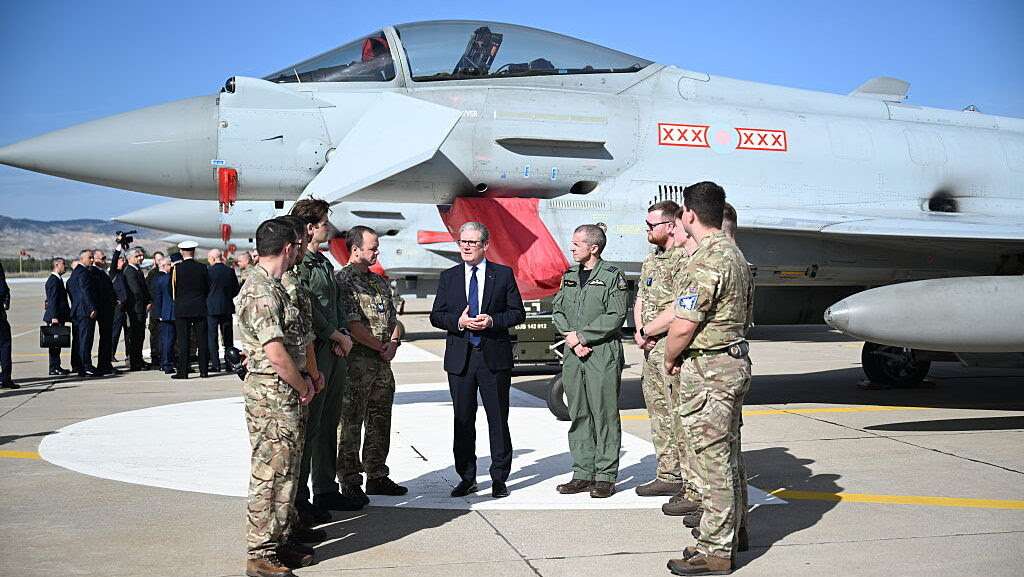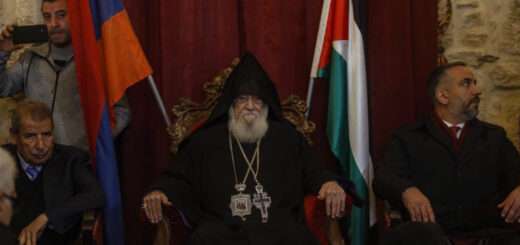London’s Eurofighter sale to Turkey: A win for industry, a loss for strategy

Approving the sale of Eurofighters to Turkey may have had good optics. but it undermines NATO’s collective security, argues Sinan Ciddi from the Foundation for Defense of Democracies.
When British Prime Minister Keir Starmer and Turkish President Recep Tayyip Erdogan stood side-by-side in Ankara on Oct. 28 to announce Turkey’s purchase of 20 Eurofighter Typhoons worth roughly $10 billion, the optics were triumphal. Starmer touted a boost for British industry and a strengthening of NATO ties. Erdogan celebrated what he called “a milestone” in modernizing Turkey’s Air Force.
For London, the sale looks like an industrial success story. For Ankara, it’s a strategic breakthrough — its first major non-US fighter acquisition, and a bridge to full defense independence. But for the alliance, it’s a strategic blunder — and a missed opportunity from Starmer to push for concessions from Erdogan.
The Eurofighter sale capped off a two-year negotiation. After Ankara reached a preliminary understanding with the UK in mid-2025, the deal still required the consent of the Eurofighter consortium’s four partners — Britain, Germany, Italy, and Spain. Berlin’s initial hesitation delayed final approval until October.
For Turkey, the acquisition fills an urgent capability gap. The country’s F-16 fleet, once cutting-edge, is aging fast. Ankara’s plan to buy F-35s collapsed in 2019 when it was ejected from the program and sanctioned under CAATSA for purchasing the Russian S-400 air defense system — a system NATO leaders warned could expose the F-35’s stealth profile.
Since then, Ankara has searched for alternatives. It sought new Block-70 F-16s but found the price tag high and US political appetite low. The Eurofighter Typhoon now serves as a stopgap: a capable 4.5-generation platform that bridges the gap until Turkey’s homegrown KAAN fighter can reach production.
That bridge, however, comes with geopolitical freight. The Typhoon deal underscores Turkey’s intent to diversify away from the United States and build a defense posture less constrained by Western oversight.The Eurofighter purchase is more than a fleet update —it’s part of Erdogan’s long-term strategy to free Turkey from reliance on US technology.
The centerpiece of that ambition is the KAAN, Turkey’s prototype fifth-generation jet. Ankara’s goal is to field a stealth aircraft that can compete with the F-35. The early flight tests have generated national pride but remain dependent on US-built F-110 engines. Export licenses for future engines are already constrained by Congress.
Until Turkey can manufacture its own powerplants, KAAN remains aspirational. That’s why the Typhoon acquisition matters. It gives Turkey time, training continuity, and leverage — all while sending a message that Ankara can find partners outside Washington when it wants to.
From London’s perspective, approving the deal was a simple equation: More exports means more jobs. The UK defense sector, especially BAE Systems and Rolls-Royce, will benefit, while Starmer gains political credit at home as a jobs champion.
But this industrial win masks a strategic loss. Turkey’s defense modernization no longer serves NATO’s collective security — it serves Erdogan’s autonomy project.
Moving Away From The West?
Turkey is not buying Western aircraft to enhance interoperability. It is buying them to go its own way. Foreign Minister Hakan Fidan said as much on Oct. 5, complaining that Turkey is “encircled” by alliances in the Eastern Mediterranean — naming Greece, Cyprus, Israel, and the United States — and warning that unresolved disputes could be handed to the military.
In other words, the aircraft London just agreed to sell could one day confront the very allies Britain claims to support.
Starmer’s decision also ignores a glaring precedent: Turkey still possesses the S-400 system that got it kicked out of the F-35 program. Ankara has made no attempt to divest itself of these missiles. Yet Erdogan continues to insist Turkey deserves to receive F-35s because it paid for them.
That mindset betrays what one US observer described as a “transactional and entitled” understanding of defense procurement — one that ignores export controls, end-user agreements, and trust. (Turkey has also secured rights to purchase additional used Eurofighters from Qatar and Oman, but their eventual transfer to Ankara will still require London’s consent.)
By approving the Typhoon sale, Britain effectively validates Erdogan’s argument that cash trumps conduct. It tells Ankara — and other would-be buyers — that alliance norms are negotiable. Washington has long refrained from authorizing the sale of advanced weapons capabilities to Ankara, suspicious of Turkey’s short- and long-term intentions as an ally. There may have been a prudent path to greenlighting a jet sale to Turkey, especially when Starmer was holding a winning hand. Instead, he chose to settle.
Starmer squandered a valuable opportunity to demand firm assurances from Ankara before approving the sale. Conditioning the Eurofighter deal on Turkey’s commitment to halt belligerent actions against Britain’s European allies like Greece and Cyprus, or to take a firm stand against terrorist entities like Hamas, would have been entirely reasonable —especially given Ankara’s provocations that risk triggering armed conflict in the eastern Mediterranean.
Britain could also have demanded tangible action from Ankara beyond its token gestures against Russia. Since Putin’s invasion of Ukraine, Erdogan has avoided any decisive stance against Moscow. Turkey did close the straits to Russian warships and supplied drones to Ukraine, but it simultaneously helped sustain Russia’s war economy — selling dual-use goods like microchips and only halting illicit financial flows after severe warnings from US Treasury officials. Despite its NATO membership, Ankara continues to resist implementing the international sanctions regime and has repeatedly sought to join organizations that undermine British and European security interests, notably BRICS and the Shanghai Cooperation Organization.
The UK also could have used the sale to push towards more democratic reforms. Shortly after Starmer inked the contract in Ankara, Turkey’s pro-government media accused opposition leader Ekrem Imamoglu of being a British agent working for MI6. The accusation — a transparent smear designed to silence Erdogan’s most credible rival — didn’t seem to trouble Downing Street.
That silence matters. When the leader of one of the world’s oldest democracies signs a multibillion-dollar defense deal with a president who jails journalists and criminalizes opposition, it signals that industrial profits outweigh democratic principles.
There is precedent here. The Biden administration only approved the sale of Block 70 F-16 fighters to Turkey after Erdogan relented and agreed to approve Finland and Sweden’s application to join the NATO alliance in January 2024. Approving the sale of fourth-generation F-16s by Washington was tied to tangible gains. It demonstrated Washington’s resolve to help modernize a NATO ally’s military capability, but showed that even allies have to follow rules to get what they want. This was an example that Starmer could have adopted.
It’s also something that the US should follow when debating the question of whether to allow Turkey back into the F-35 program. I have argued previously that Turkey should not be allowed back in, but the Trump administration seems at least somewhat inclined to approve the F-35 in the future. If that is the case, the administration needs to think strongly through what concessions it wants in return, whether that be democratic reforms, increased basing rights or something else.
Unlike London, Washington should seek to maximize its leverage while it has it, because as soon as Erdogan gets what he wants that leverage will disappear.
Britain’s Eurofighter sale may deliver economic dividends, but strategically it’s a misstep that empowers a regime moving in the wrong direction. Erdogan is building an independent defense ecosystem — one that will eventually compete with, not complement, Western industry. The Eurofighter deal won’t bring Turkey closer to NATO — it will show Erdogan that pushing in his own direction comes with no real cost.
Starmer’s government can celebrate jobs and exports today. But the price will come later — when Turkey’s next-generation jets, built on a foundation Britain helped supply, fly missions that serve Ankara’s ambitions rather than NATO’s.
Sinan Ciddi is the Turkey director at the Foundation for Defense of Democracies.





